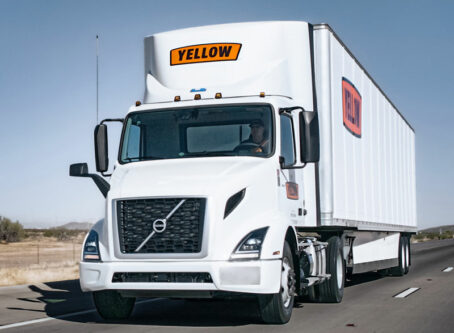Has trucking finally found the automated holy grail?
At least two new truckload companies claim they’re close and getting closer to the automated holy grail.
One is a new company named Variant that operates within a familiar, older one – U.S. Xpress. The other is an Austin, Texas, startup named AI Fleet. It’s safe to assume that AI in this case stands for artificial intelligence, an important factor in the development of both companies.
Both claim they’re super-duper driver-friendly, offering more frequent home time, fewer delays, more miles, and everything but free ice cream. Both claim their technology automates the process of accepting and dispatching loads. The machine finds, negotiates, and selects just the right loads to maximize paid miles and minimize delays at stops. It also updates constantly, adjusting for weather, traffic, delays, and all the unpredictable things that plague trucking. Drivers are dispatched entirely by algorithms that consider their on-duty availability, scheduled home time, and more. Artificial intelligence, or machine learning, improves the technology with experience. At least that’s what they claim.
AI Fleet boasted to CCJ Digital that no driver has left for another carrier since they started operations in April 2021. They do concede, though, it’s bound to happen someday. AI has 35 or so drivers, a third of whom are women, according to Forbes. The company guarantees a minimum annual salary of $67,600 and home time every week. Running on investment money, AI Fleet has a long way to go before it hits the big time and we learn if drivers really love them or not.
Variant is bigger and has been operating a little longer. It also has a big head start with loads from its parent company, U.S. Xpress.
Variant claims to have 1,500 drivers as it grows within the U.S. Xpress organization. Its recruiting splash page says it is “putting drivers back in the driver’s seat” – a bit of a headscratcher even when you know what they’re trying to say.
With growth in mind, Variant has come up with a twist on traditional driver recruiting. Variant encourages current drivers to recruit new ones. A Variant driver who brings another driver to the fleet receives 2 cents for every mile that recruit drives. A recruiting driver is called an “ambassador.” He or she and the driver(s) they recruit are called a “squad.” When another “squad” member recruits a driver and starts collecting their 2 cents per mile, the original ambassador will receive half-a-cent for each mile driven by that new recruit. The system currently goes down four levels, and there is no time limit on the mileage dividends, according to Variant’s Brad Carmony.
True, it resembles a direct-sales or even a pyramid scheme, but it is neither. Drivers do not put in money. Money comes to them, and Carmony said one driver’s cents-per-mile dividend does not come out of another driver’s pay. It is paid by the company. Still, Variant’s mileage pyramid idea is less about making life better for drivers than it is about recruiting more of them. Maybe they should all be wearing military stripes, medals, and shoulder epaulets.
Curiously, AI Fleet and Variant have more in common than automation of the trucking business.
According to his LinkedIn profile, AI Fleet’s CEO Marc El Khoury worked for U.S. Xpress with the title chief strategy officer for “less than a year” in 2019. U.S. Xpress launched Variant in June of 2019. I doubt that’s a coincidence. It’s also interesting to note that in December 2021 U.S. Express suddenly fired Cameron Ramsdell, then president of the Variant operation along with other responsibilities at the company. No explanation was given, though U.S. Xpress did reaffirm its commitment to Variant. That may very well be just a coincidence.
In any case, Variant and now AI Fleet may be the beginning of a new era, something big trucking has dreamed of from the day the first carrier met its first computer.
In those days during the 1960s, programmers sat in trucking company departments for months on end. They would trace, note, and analyze every step and decision – no matter how small – in every business process a department handled. Then they would attempt to convert that minutely detailed knowledge into code for the big mainframe computer housed in its own temperature-controlled room. More than one big carrier nearly failed after a newly programmed computer seized up billing and checks stopped coming in.
Big trucking survived those early days and devoted more and more resources to the machines that would eventually replace virtual armies of clerks who once typed out bills of lading, manifests, freight bills, statements, and much more.
But the core business of finding, booking, routing, and dispatching freight seemed immune from automation. There were simply too many constantly moving parts for programmers to program and computers to compute. Automating all that stuff would take decades and super computers far beyond the resources of even the most prosperous trucking company. It was trucking’s holy grail.
Well, maybe someone has finally found it, or at least a piece of it. If U.S. Xpress hasn’t been the most technologically innovative carrier around, they have certainly been among the most likely to publicize their accomplishments. I’m surprised there hasn’t been a lot more noise about Variant. Of course, AI Fleet has no history.
It will be interesting to see how this plays out and whether these two automated carriers are in fact the first of a new technology wave. LL









